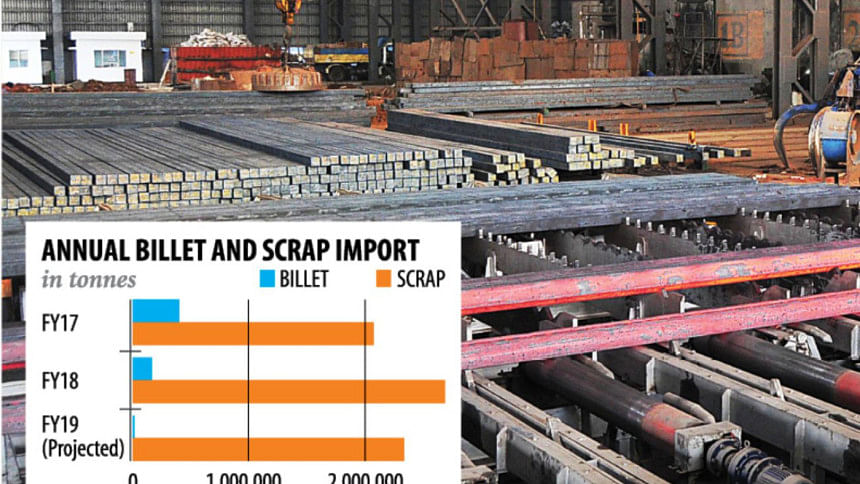Bangladesh self-sufficient in billet production

Bangladesh has become self-sufficient in billet manufacturing on the back of huge investment made by large steel mills, which bumped up their production capacity for the key raw material of steel products.
Five years ago, steel mills had to import half the total requirement for billet to make steel to feed the domestic market, said Md Shahidullah, secretary general of Bangladesh Steel Manufacturers Association (BSMA).
Local mills now produce around 60 lakh tonnes of billet annually, enough to manufacture 55 lakh tonnes of high-quality rods.
The expansion spree by the BSRM, Abul Khair Steel, GPH Ispat, KSRM, Metrocem and Anwar Ispat in recent years has enabled the country to reduce its reliance on imports for billet.
The firms went for boosting steel production capacity to meet the burgeoning demand for the construction material.
Today, 35 mills make billet by importing scrap, said Shahidullah, also the managing director of Metrocem Steel.
Sector people have said local mills, mainly the large ones, signed up either for billet-making or capacity expansion buoyed by the increasing demand for steel thanks to the implementation of mega infrastructure projects. An improvement in power generation also encouraged them to invest more.
Tapan Sengupta, executive director of the BSRM, which can make 18 lakh tonnes of billet annually, said the expansion in billet-making capacity has helped save large amount of foreign currency that would have been needed for imports.
Bangladesh used to import billet mainly from China, the US and India when it produced billet below its annual requirement. Now the import demand for billet is insignificant.
Billet import fell to 1.65 lakh tonnes in 2017-18 from 16.96 lakh tonnes in 2014-15, according to customs data. Meanwhile, scrap import has soared and Sengupta said the use of scrap has cut the production cost of steel by at least $158 per tonne.
“The price of rod is now tolerable because of the local production of billet,” he said, adding that the price of steel would have been Tk 12,000 higher per tonne than the existing market price had billet not been produced locally.
On May 2, the price of 60-grade rod was Tk 62,000- Tk 67,000 a tonne, according to the state-run Trading Corporation of Bangladesh.
The import of billet has decreased significantly in the last five years owing to the government’s policy support, including a duty hike on imports.
At present, import of per tonne of billet is subject to Tk 800 of advance income tax along with 4 percent advance trade VAT, 15 percent VAT and 20 percent regulatory duty.
Shahidullah urged the government to continue providing the regulatory support to help the sector grow so that its contribution to the economy rises further.
Bangladesh is one of the emerging steel markets and has a growing need for raw materials and semi-finished materials, according to Steelmint, an India-based information services provider.
Steel production capacity was 30 lakh tonnes in Bangladesh in fiscal 2015-16, up from 10 lakh tonnes a year ago. The capacity expansion drives have continued in the subsequent years.
Mohammed Jahangir Alam, managing director of GPH Ispat, said local manufacturers were adding value and helping to reduce the price of steel in the local market.
“The billet industry has itself become big along with the finished steel industry and created employment for many.”
GPH Ispat’s billet manufacturing capacity stands at about 10 lakh tonnes annually, Alam said, adding that they were raising capacity further.

 For all latest news, follow The Daily Star's Google News channel.
For all latest news, follow The Daily Star's Google News channel. 



Comments